Overweight Superheroes and Supervillains
Throughout comic book history, there have been superheroes and the physique of superheroes, for the most part, has stayed the same. The muscular Steve Rogers (or Chris Evans) has been prominent in the comic book universe in the past few years. And, since they are not creating new superheroes as often, it, unfortunately, seems to stay that way. The thought that you have to be muscular and look like Black Widow or Steve Rogers is an imaginary view of what superheroes should be and look like. Although, since that has been what they have wanted you to think, is the thought of having an overweight superhero realistic? Do writers think that they are not realistic in a sense that they cannot do what Steve Rogers can, or what Batman can? Can a superhero drink beer just like the rest of them and have a beer belly and still kick ass any day? These are the questions that might run through a readers mind in 2016. As a society, we are becoming more body positive and aware of things that do not really suffice our needs for that. Readers may start to question where they are and if they were here – well… where did they go?
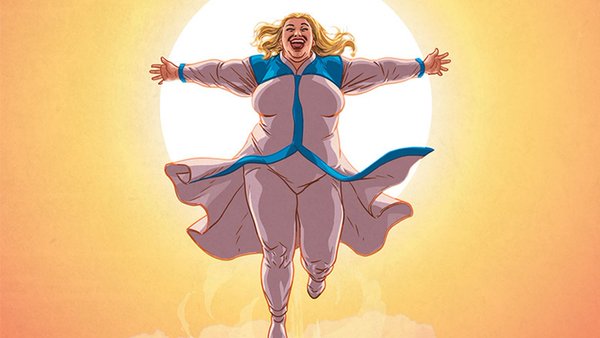
Here is a list of overweight / plus-sized superheroes (villains and heroes, both are important) from the past that are not really in the limelight like the fit and muscular ones are. But, we cannot forget about them and for that this list will bring them back.
Overweight / Plus-Sized Superheros and Villians
First, we have Kingpin (1967) who first appeared in The Amazing Spider-Man #50. Who is not only considered to be an overweight supervillain in the comics, but also the show ‘Daredevil’” too. What is interesting to know about Kingpin is that he is actually entirely muscular and very strong, he just appears to be overweight. And, if you have experience with Kingpin, you know he can get down with the rest of them because he kicks some major butt. One of the coolest villains in the history of comics, and oldest. This is a good representation of a superhero who appears to be overweight but is simply really muscular – like a sumo wrestler. He is also crimelord.
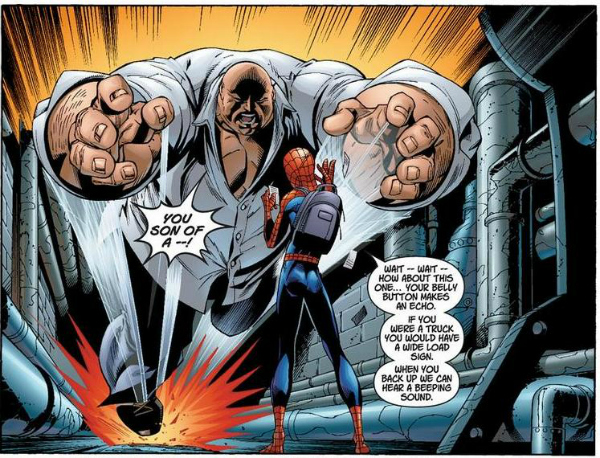
2. Volstagg (1965) who first appeared Journey into Mystery #119 from the Thor comics would be great to talk about because he has a belly and some would consider that to be “overweight” or of a bigger weight than that normal superhero. But, then again he is muscular as well and can kick butt with the rest of them. Being from Thor comics means he is light on his feet, which means the weight has nothing on him being a superhero at all. This is another instance where being overweight has nothing to do with performance of the superhero at all. They still kick butt and do it well enough to have continuous issues. It is said that Volstagg used to be thin and muscular in the past, throughout issues, but seems to have gained weight as implied.
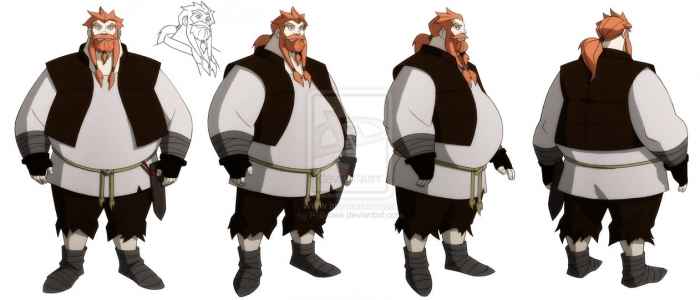
3. Blob (1964) who first appeared in X-Men #3, a supervillain as he is called considered to be overweight – but, on the other hand, he is also a fantastic supervillain. His skin is proved to be elastic and blubbery, he also has superhuman strength and endurance. Even the argument that overweight or “more weighted” superheroes cannot run as fast as muscular and fit superheroes, does not apply and has not applied in the previous two. Most of the ‘overweight’ superheroes still kick butt and that is no different with villains and with Blob as well.
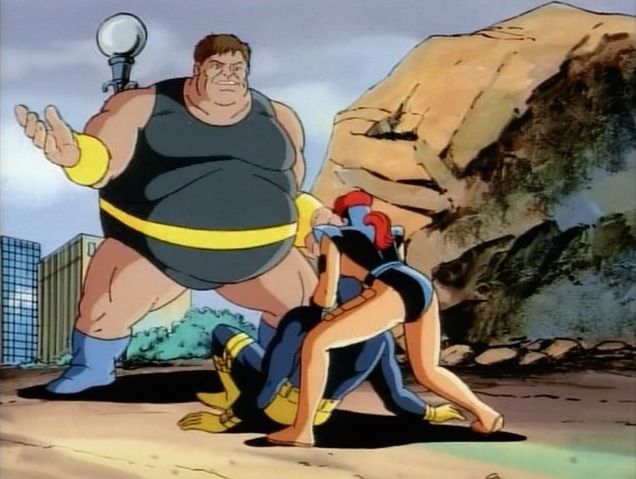
4. Big Bertha, also known as Ashley Crawford is an overweight superhero as well – in the Marvel comics, first appearing in West Coast Avengers vol. 2 #46 in 1989. Considering the name, she is considered to be overweight. Big Bertha has the ability to make herself stronger than most and durable than most also. She also has the ability to be bulletproof, by being “obese,” as she is considered. What is interesting about Bertha is she can make herself skinny as well by purging fat from her body and making herself have a slimmer appearance. Even though she kicks butt, she also has the ability to become skinny and overweight at the same time in one superhero, which proves to be an interesting way to go about a superhero. Bertha proves to be the best of both worlds, but does she counter this notion of being an overweight superhero by being the best of both worlds?
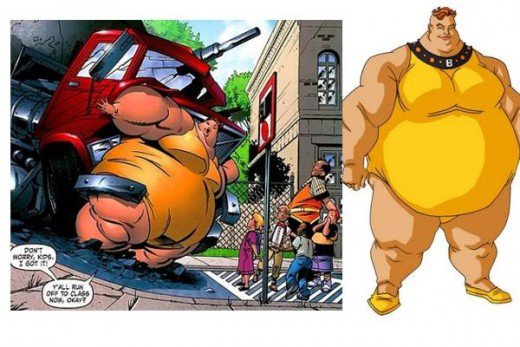
5. Bouncing Boy, first appearing in Action Comics # 276 in 1961. The Bouncing boy has the ability to expand his body to a sphere-like shape, being a ball, in a sense and bounce anywhere and everywhere. When he is not a ball, he is considered to be ‘overweight,’ but still has the ability to be the head of the League of Superheros. As he may be overweight he is also a superhero, which indicates in another instance that he is still capable of being a superhero despite being ‘overweight.’
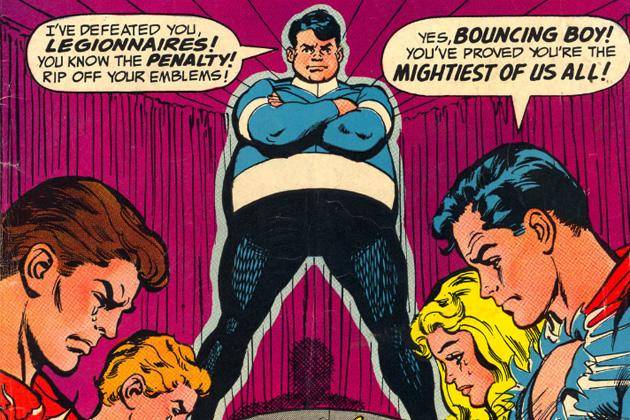
6. Slug aka Ulysses Lugman first appearing in Captain America #324 in 1986. He is a supervillain, similar to Kingpin he is a drug lord operator / crimelord. Although he is an overweight supervillain – he is also the biggest crime lord and it proves to have no impact on his success whether he is overweight or not. His obesity proves that he is indestructible when being shot at his organs are harder to get to because he is so overweight. Slug can also suffocate his opponents with his body fat and is extremely intelligent.
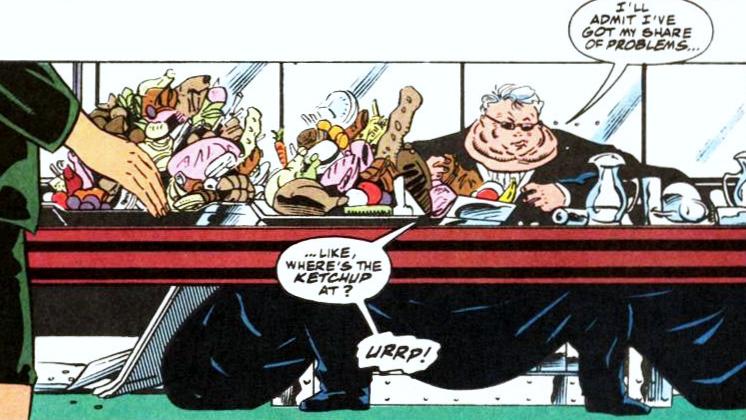
7. Pink Pearl (a supervillain and terrorist) who first appeared in Alpha Flight #22 in 1985. She is considered to be obese and that results in her having above average strength and durability. Although she has no superpowers, her weight gives her abilities that make her a force to be reckoned with to her opponents.
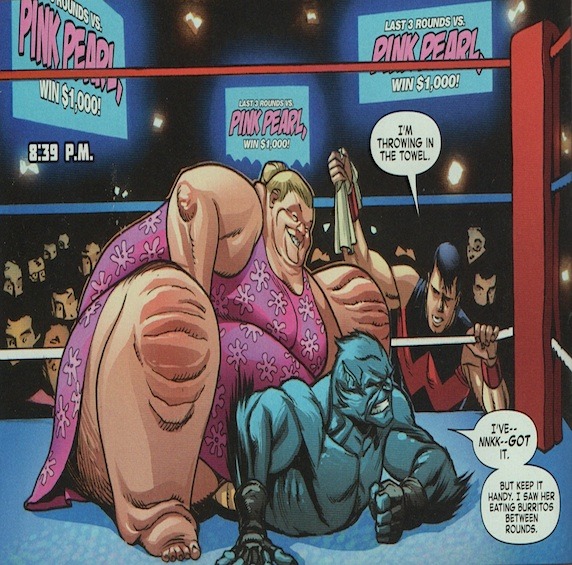
Lastly, the more recent comic superhero named Faith who has come into the scene back again. First appearing in JLA #69, in 2002. She instills flight, telepathy, and teleportation. She is often named by her teammates “the Fat Lady” in reference to the line “it’s not over until the fat lady sings.” She has been taking into the newer generation and considered to be “plus-sized” instead of overweight like in the past 7 bullet points of overweight superheroes. Faith being the most recent plus-sized superhero and kicking major butt out there it proves to show that we are capable of having them, right?
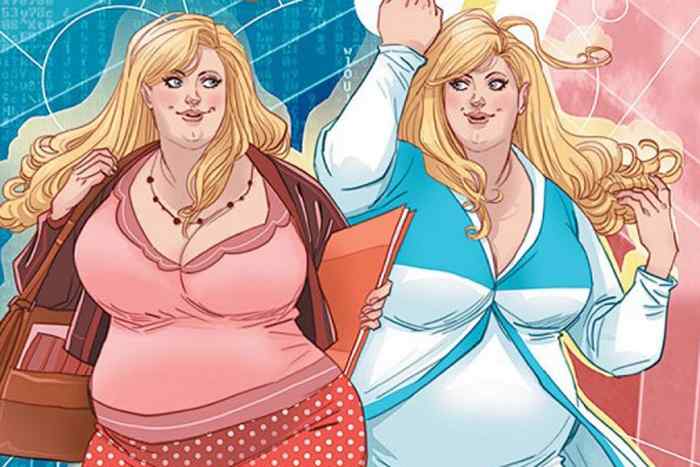
That brings me into why it seems to be that more plus-sized superheroes are not being made or brought back. Even if they don’t want to make any new superheroes, they don’t have to – they can easily bring back old ones such like the ones in this list. They can make them more millennial-ized and make them a really rad thing to have in the next coming years. Being body positive is so important to have always and to have that in comics would be such a great experience for readers who are struggling with that. But, not only that, it can show people that you don’t have to be muscular and fit to be a superhero. You can be anyone and any size and be a damn good superhero.
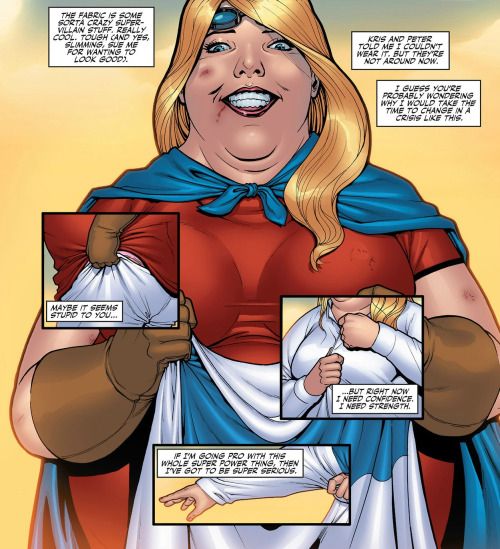
All of these superheroes as well as supervillains because villains prove to be a vital part in the comic book world. Not only for being a villain but without them there would not be superheroes to save the day. They are mentioned above because any instance of mentioning body positive characters should be mentioned no matter what they stand for in a comic book series. They prove to be a vital part to show that even though they were obese, plus-sized, or overweight they still has the muscles and ability to kick butt. That did not hold them back or make them less of a superhero or villain because they were a certain size. They still were capable of being the best and doing what they do best and that is an important aspect to take away from this.
Will comic book characters start to be more body positive? Faith is a good way to start and it is a happy day when we have one being made for body positive; but, will it continue? Well, one can hope. The readers would hope that they would not make one and completely forget about how we need more of them in the community. One can only hope to see more and hopefully we will soon, time will tell. Until then, the older editions are better than nothing.
What do you think? Leave a comment.



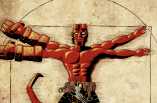
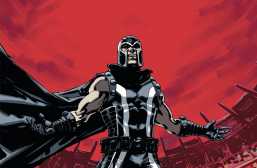
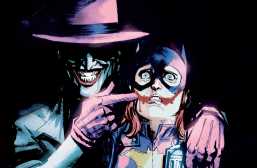
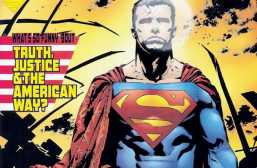
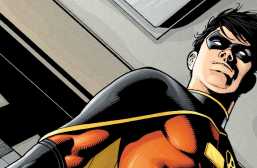
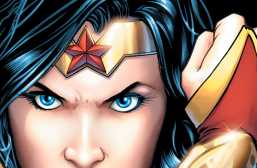
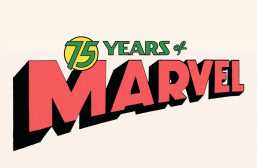
Wonderful job, scole! Because of my limited comic book knowledge, this article taught me a lot, and I’m so happy someone chose to write on this topic. One can hope for positive body representation in future comic book editions.
Thank you for the positive reinforcement 🙂 I am glad you enjoyed it!
When you think about it, most superheroes should be plus-sized considering all the flying and lack of walking they do. It’s surprising none of their legs have atrophied from lack of use.
Faith has interesting plot arcs (grand/epic fights against X). I love her.
I agree! She is awesome!
They should be proud of who they are, while at the same time try to better themselves, should they feel the need to. Being overweight, while not healthy of course, isn’t made any easier by the negative outlook on their appearance. Superhero stories, while being about high-action, also have a tendency to show how ‘human’ these gods among men are. Having a superhero who has a weight problem during their secret identity and social life could have a similar, positive reception as heroes who are gay or socially ousted for reasons such as their hobbies, clothes or philosophy.
Then again, Superheroes are also meant to be a symbol of some kind. This symbol is one that is meant to be abstract, or beyond human. People follow symbols and non-human ideals (in the comic book world, at least) more than actual people in most cases. In that sense, it gives justification for the abs you can grind steel on or the boobs bigger than basket balls and just as firm. Making the character seem more human in that sense may bring that symbol down a bit. “What? He’s just like a regular guy, what can he do?” Though, in that same sense, it might have the opposite effect. “Hey, look at that guy. He can really do anything when he puts his mind to it!” and this can be bolstered if that guy has a weight problem.
It does seem like we are creating a society where women and men in the public eye, and thus the characters they play on films and TV, must conform to increasingly unattainable standards of physical perfection or risk being discarded. I think there’s a yawning chasm of space waiting to be filled by superheroes who look and act just like ordinary people, and I mean actual ordinary people.
Great topic to touch upon.
Interesting view about the comic book world. I never saw heroes as being a subject to social health issues such as obesity. It is true they have an influence on pop-culture and personal image like anybody in the limelight could.
Superheroes have to be muscular and physically fit to fight crime. Not a blob on the verge of a heart attack.
An insightful article that makes me think. Kingpin has always been my favorite villain. I think Vincent Donofrio does an amazing job playing him and even creating pathos for how Kingpin deals with his past. A big guy who looks tough but has demons in his past. Who can’t identify with that? Big or small.
Kingpin is pretty awesome, indeed!
A good reminder of the importance of representation. Hope to see more of these characters – variety is always appreciated!
Me too, thank you 🙂
I don’t see the harm in including more overweight superheroes, especially as the ones mentioned in the article appear to use their bodies to their advantage. The problem I have is how nowadays there are so many Social Justice Warriors, namely on Tumblr, so obsessed with making everything so politically correct, and that includes them being obsessive and hammering ideas of how shows and movies these days should portray more fat protagonists and not “fat shame.” It would be interesting to see though as it would be more diverse and even make for some interesting ideas.
This is an interesting article. Honestly though, if these villains and superheroes were more so present in the comics, including the movies, the masculine/hourglass figure wouldn’t be conceived so highly the norm. I’m sure many are familiar and oblivious to the fact there are obese/plus-size characters in comics, but we love the to see the muscular/hourglass types. I think if illustrators made the plus size and overweight characters look as a beautiful as the fit ones then the readers would become aware of the many shapes and sizes. Furthermore, if comic illustrators did this then they’d be somewhat stepping out of the fantasy realm by bringing other body figures into the spectrum. This is a great topic everyone can relate to!
It’s interesting, that in many of the examples their fat or large physique is a part of their superpower. Their large body makes them strong and “durable.”
Hope we see movies of some of these heroes soon.
Me too, as I was researching these cool characters I was feeling great about how many I found!
Kind if surprised to not see the Penguin on this list. A well known, obese, Batman villain that first appeared in Detective Comics #58 (December 1941). I would have thought him an obvious choice and an immediate auto-include. Then again, perhaps too obvious.
His weight and short, stocky frame does not factor into his powers at all. Quite the opposite, actually. It is often exploited by Batman during their encounters (One that springs to mind is the recently released Batman: Arkham City videogame). Perhaps a subtle mental nudge to the audience?
I love Penguin, but it was an obvious choice! I decided to touch upon ones that were heard of so much, but I love penguin!
The way to introduce an heavier super-hero is simple, have a well-written charactert just happen to be large and not making him being on the heavier the focus, just another trait.
Maybe he’s a bookish wizard, constantly studying arcane hoary rituals and spells, such that he doesn’t have the time or desire to exercise because nothing he does is based on his physical abilities. Maybe he’s a techie with a powersuit, maybe he’s a supremely talented psychic who compensates his lack of physical potence with powerful telekinesis and biokinesis. Or maybe he’s super-strong and tough but happens to be lazy, thus he just happens to have a beer gut.
This article made me realise there are more fat villains then there are heroes.
is that a good thing or a bad thing?
Wolverine was fat once in an alternate universe
If you like superheroes at all, you have to admit they all have certain qualities that are unbecoming. None of them are perfect. So it’s really a double standard to say we can have alcoholics, murderers and others don the title of superhero in comics yet not fat people.
Yes! Thank you!
Fat Cobra is awesome. And his powers aren’t necessarily due to his largeness. He’s got superspeed and can create lightning blasts. Though he’s also super strong, durable and heals as well.
This is a pretty awesome post.
Thank you! 🙂
Just for technical reasons, not very many obese people could kick butt to the same standard that a slimmer person could. You couldn’t exactly kick someone in the face or really kick at all with an enormous stomach in the way. I think the idealized “superhero” physique is the popular one because of the type of combat the heroes engage in, and in that context it wouldn’t be believable that someone heavier would even be able to move in ways that they would need to. On another note, superheroes are always considered to be paragons, an “ideal”; someone to look up to and, really, someone to aspire to be like. Being obese is unhealthy, and setting it up as a desirable thing to be could be just as disastrous as the current unrealistic body image problems that comics promote. Interesting article, and it’s definitely something to think about, but superheroes have the unrealistically fit bodies they do because of the ridiculously unrealistic lives they lead.
Yes, but comics being unrealistic like you said, it could possibly work in the long run when you think about it. Aside from kicking someone in the face and kicking high, maybe they have another power that could suffice for that. Some obese or ‘fat’ people are not unhealthy, they are healthy and just don’t have fast metabolisms like other people do.
Hmm. This is complex because it involves feelings and how we treat people and want to be treated, but it also demands some honesty about health facts and science.
It’s awful to make someone feel bad because they’re overweight. They likely feel bad already, and knowing that, we shouldn’t make them feel worse. That’s bullying.
On the other hand, we have more than enough evidence to know that obesity is unhealthy, and metabolisms don’t vary from human to human enough to account for levels of obesity, so we must be realistic in our portrayal and conversations.
However, there’s nothing wrong with wanting to portray normal or slightly overweight people in a positive, enabling light, but that should be reasonably tempered with the reality that obesity is unhealthy and we should strive to fight it. Think of it this way – we know cancer is bad, so we dislike cancer. We don’t dislike people with cancer. We know obesity is bad, so we dislike obesity. We don’t dislike people who are obese. We need to separate the person from the problem and establish sensible boundaries between body positivity and science-based health.
People, especially younger people and people who have recently reached obese weights, may test as healthy for a short amount of time, because obesity wears on the body and organs more the longer someone remains obese and the more weight they gain. So if I gain thirty pounds this year from stress eating, my tests will reflect little strain on my joints and relatively healthy blood tests. I’ll still be able to do activities I was used to with slightly more effort, which will load on so gradually I won’t notice it. So I’ll proclaim to everyone: “I’m obese but healthy!” But if I sustain the heavier weight for years, the wear and tear on my body will add up faster, and I’ll become less healthy faster. We know from recent health budget increases that it sure does cost society much more to care for obese patients, and we know from studies that obesity is dangerous and has many long-term consequences.
We also know that telling obese people to feel bad and eat less isn’t going to psychologically work, no matter how clear it is that it will scientifically work. People aren’t science robots, and there are many institutional forces that keep people from making the slow, consistent lifestyle changes that lead to healthy weights and good levels of activity.
Stories and fiction are great sources of subtle rhetoric and education without the damaging bullying or shaming of a weight loss pamphlet. I think, as an English graduate, that the power of stories is one of the most untapped resources the scientific community has. If we can get careful writers to write around the image of a superhero, confronting both the human and scientific issues around weight and health, we would be able to approach many people and correct some of the bullying and shaming as well as the bad scientific information about there about metabolisms and energy needs.
Overall, I think portraying people of more sizes and shapes is great, but it needs to be done reasonably, understanding that obesity is bad but obese people aren’t, and trying to portray someone coming to a better state of health for the sake of both the individual and the society a superhero is supposed to protect. After all, our superheros are super because they think of more than themselves, and one of the most fascinating nuances of superheroes is how they’re hyper aware of the implications of their actions on their community at large and the impact their actions have. It would be a great source of education to see an overweight superhero who has the normal, human flaw of an unhealthy relationship with food working through the connections of being obese and the impact it has on society and realizing for themselves that they can make a positive change as a normal person as well as a super person by making the informed choice to be healthier and reduce their eating habits.
There’s a huge difference between shaming someone externally into weight loss and someone doing it from internal strength and motivation – I think that it takes superhuman strength to look at yourself and need to make a change and follow it through. Wouldn’t it be great if we combined overweight superheroes, health, and motivation to help people find a narrative to empower them in their real life?
I find out of most of the character’s in that list Faith is probably the character treated with the most respect in regards to her weight, though Volstagg is shown as a great warrior, and the Kingpin’s figure is supposed to be imposing and showing him as being “larger than life”. Character’s like Pink Pearl and Big Bertha seem to be more created as an unfortunate joke where their looks are more defining then any characteristic of them. Kingpin at least has an interesting backstory and Faith is shown to be more rounded a character than just her physical looks.
Very interesting article. Sadly especially among heroes the full figured person is often also the butt of jokes. Still I think past cultures were more comfortable with large individuals. For example, while she was not a super heroin I think of Etta Candy, Wonder Woman’s sidekick and part of the “the Holliday Girls” all who attended the Holliday College for Women. What a fighter she was.
http://io9.gizmodo.com/the-wonder-woman-movie-adds-etta-candy-dianas-best-fri-1760553556
Another favorite of mine is Taurus, often affectionately called “you old Walrus” by Scott McCloud who is “The Space Angel” captain of the spaceship Starduster. This was, of course, primarily an animated show but it was made into a comic in 1963, when Alex Toth drew a Space Angel series that was published in Jack & Jill magazine. The thing was due to the primitive animation, the show it itself was little more than a comic whose figures were moved around on the screen. On this page you can see several shots of Taurus in his hefty glory: http://www.comicbooktidbits.com/Spaceangel.htm
I am going to disagree with the notion that fat superheroes should be promoted and adored; or that any body type can qualify as a superhero. It is just not true nor is it realistic – neither for superheroes or real people!
First of all, superheroes need to be fit. In fact, anyone who aspires to do any superhuman physical activity needs to be fit. Maybe some fat superheroes are fit–I won’t deny that–but, overall, “fat” is not a symbol of health and vitality, let alone, fitness! Why would comics or any other media want to disseminate the back story that you can be a superhero no matter your body type? It’s as if we’re living in a fantasy world (right, it’s comics we’re talking about!).
Second, I think we have forgotten that it takes effort (and stamina) to be as good as we can be both physically and intellectually. Super-achievers are those that put in a lot of hours into developing themselves on all fronts in their pursuit of perfection. How is a fat superhero a symbol of perfection? Where’s your proof?
Somewhere along the road between Baby Boomers and Millennials (and moving to the new Gen Y, or whatever they are yet to be called), we have lost our way. The notion that anyone can do anything is not only fantasy, but it’s a fantasy that sets one up for failure – superhero or not!
That said, if “superhero” is someone who is not called upon to perform physical feats of super-strength, then body type does not matter. We can all be compassionate, caring, and “super” in our own way. Maybe that’s what the comic book heroes are trying to portray, but, please, fat and fit do not go together nor does the word superhero work with that pair!
I think my generation (GenX) can probably take the credit for dropping the ball as you have put it. But in our defense, we mean well. Also, some body types are just huskier. Ask any parent and they will tell you that some kids are just born bigger and then fed more because it is assumed that bigger kids need more food.
I think the thing with superheroes is just that usually it is someone like Steve Rogers or Peter Parker who is on the smaller side and ends up becoming a superhero with the body and skills to go with it.
I agree with you that fat does not equal fit though. But being very petit myself I like being able to live vicariously through these larger than life heroes.
Thank you for your feedback, Munjeera.
I get that people mean well most of the time. However, just because we start out “meaning well” should not mean (pardon the pun) that we should continue down a path that ultimately is the wrong path.
My concern with inaccurate portrayals like fat superheroes (yes, I know some would like to coddle the term and say they are husky, overweight, big boned, and so on) is that they instill the wrong message. There is no such thing as a fat superhero with superhuman physical strength, no matter how much one wishes to believe. However, if the purpose of watching fat superheroes is for comedic purposes, then bring them on! But comedy is a whole other story.
What constitutes comedy? Is making fun of fat people funny? Is making fun of rich people funny? Or the downtrodden? Does it depend on context? Likely yes, but that’s a debate for another topic.
I think the danger to making those who are not stereotypically or traditionally seen as having desirable traits is that people start to believe that physical differences point to internal shortcomings. I don’t think size should determine comedic potential.
I can tell you as someone who is not a Millennial, that in my generation women were portrayed as a lot thinner in the media. A lot. What constitutes an attractive female body today certainly would not have cut it in my time. The idea that curves could and are attractive would have garnered the same comedic expectation. Personally I am happy that we are past the era of stick thin women being the ideal.
In the same way, I hope that movies like Black Panther will portray African women in a very positive light and also will promote women with various body shapes and sizes as Marvel has promised that most of the cast will remain faithful to the original roles. Beauty is in the eye of the beholder and can also be culturally defined.
Of course, beauty, superheroes, our belief system, our values, ideologies, and so on are all culturally defined. In the North American culture (if we dare to cast the net so wide), it is likely that we have raised a generation (or two) of people that enter into business, go to work, go to school, etc. with the expectation that they can become millionaires overnight, they can become the CEO of the company by next Monday and that every course they take in school owes them an A+.
Superheroes are just another cog that feed the fantasy. I’m not saying that fantasy is bad; on the contrary, it’s good to let the mind wander, but if we’re going to fantasize, at least aim for a more realistic superhero. Every fantasy needs a bit of grounding in reality.
Moral purity and idealism meets reality and cynicism. Don’t forget escapism. Not to mention hope vs. pragmatism. Faith vs. science.
In the world we live in, where terrorism can snuff out a life at any minute, perhaps these movies offer a sliver of optimism in the face of a seemingly inevitable dystopian future.
But I do know many people who share your world view. I am not one of them though because I have so much respect for Millennials. But all the best to you despite having to agree to disagree here.
Yes, BUT, not all ‘fat’ people are unhealthy and obese – some are quite healthy they just don’t have a fast metabolism like others do. There are all sizes in this world and I believe that everyone should have a ‘superhero’ to look up to if i can, (i’m really skinny) then people who are of bigger weight should as well. Glorifying unhealthy and praising people who are healthy, but just a little bigger is a completely different story. These were examples, but hopefully, comic creators would put their own spin on it.
I believe fat and fit DO go together – and that is where my millennial is coming out probably. We are the generation of approval especially when it comes to things that are not the norm for the most part. I believe that people should be able to have someone to look up to and the character would be obviously treated as someone who is obese; but, maybe, works out and is just of bigger weight because they have a slow metabolism.
Why are we even achieving for perfection anyways? It’s 2016? Why is perfection even a thing and why should we even be using that word. No one needs to achieve to be perfect and comics are starting to derive from that notion as well. I never work out, i’m simply skinny because of my FAST metabolism, I have never worked out in my life, or done any fitness at all. My life just happened to be this way. Like people who are of bigger weight. They can’t help that – it’s generational half of the time.
Why strive for perfection? Well, let’s see: Mediocre never came up with a great invention. Society would still be stuck in the dark ages if we relied on mediocre. Perfection, hard work, and striving (really striving) to outdo that last thing that you just did is how the world moves forward.
If Steve Jobs, Bill Gates, Elon Musk, Tim Berners-Lee, Henry Ford, Alexander Fleming, and others like them settled for mediocre, we wouldn’t have the iPhone, easy-to-use operating systems, electric cars, Internet, penicillin…
You’ll get out of life that what you put into it. Just saying …
Life is not in absolutes. You’re not either perfect or mediocre with no middle ground in between. In most cases, “perfection” is impossible and striving for it will only hurt yourself in the long run. As someone who suffers from Obsessive-Compulsive Disorder I know this.
Instead of striving for perfection, people should strive to do the best they can. I don’t think the people you listed were trying to be perfect either, they were trying to contribute to humanity with the best of their abilities. Sometimes there are limitations that people can’t control, the key is not to try to overcome them, but to learn to work within them. Body type can be one of those limitations.
You forgot about Gertrude Yorkes, from the Runaways comic series. She was awesome.
Oh yeah! Shoot, people should check her out!
Very interesting. Now my question to you, would an overweight superhero be taken seriously? Would be interesting to see a follow-up.
I doubt that any superhero is taken seriously. But young minds are pliable and there’s a reason that parents (nowadays, anyway) take great care in ensuring their children only watch and listen to what parents believe are “appropriate” for their age group. However, I think that today’s parents have set unrealistic expectations for their children. And that is why we find ourselves with a generation that believes anything is possible. The truth is that anything is NOT possible. Unless you’re a superhero.
Could that be the reason why superhereos are so popular? Because they reinforce our unrealistic belief that anything is possible, thus we like to confirm our own bias? Are we on a perpetual confirmational-bias loop where we think everything is possible and it’s reflected on superhereos because anything is possible because it’s reflected in superhereos because… ok you get it.
Yes, exactly. Even in the “olden” days when Superman surfaced (was he the first superhero?), people were led to believe that everything is possible. But imagine a fat Superman flying? Not likely. It would have been pure comedy. No drama there.
I believe it can be taken as seriously as people will take it, we, as a society, have to take it seriously for everyone else to take it seriously that is how things work unfortunately. I would hope it would not be a running gag for comic creators, but who knows the world is very comical about weight especially in films these days.
I did not know that there were so many oversized superheroes/villains in the comic book world. Great to expand my knowledge on this subject.
Personally, I believe that, in both fiction and real life, a person’s body type, be they skinny, muscular or overweight, is not important at all. What’s truly important is their character. I’m skinny and I look up to Steve Rogers immensely, not because he’s muscular, but because he’s a hero who always tries to do the right thing. If an overweight person were to feel bad because all their superhero role models are fit, they’re thinking about things completely the wrong way. Being truly heroic transcends race, gender or body type. They should ask themselves: Would their heroes care what they look like, or would they see the person underneath?
Really appreciate this comment, thank you 🙂
I love the idea of more superheroes with less “perfect” bodies. It maybe makes sense that people like Batman without powers need to be really fit and muscular, but when it comes to having superpowers heroes can and should have diverse body types.
Me too, it makes sense you know – that we should have multiple body types because superheroes should be able to obtain whatever body weight they are given because it is comics!
They could start with a character that is fat and unhealthy in the beginning and then have him/her lose weight and become a Superior Physical Specimen through hard work, dedication and eating healthy. In fact it’d be a great idea in my opinion.
I think so too!
Should there be fat superheroes? Well there is already a few, but doesn’t make sense unless there super power is something that doesn’t require much strength. Would I want more fat superheroes? I guess not, would I care if they made more fat superheroes probably wouldn’t care either. But if they made Batman fat >:( then we have a problem!
As a fat person myself, Im conflicted… i suppose everyone does deserve representation!
As long as the character is written well, I’m ready to read it.
I remember an X-men comic where someone (can’t remember who) refused to train a mutant because they were fat, saying something to the effect of, “You can not control your weight, so you can not control your powers.”
This is a great topic to explore—and one that should be getting more attention! I remember there was a debate when Disney unveiled “Habit Heroes” at Epcot, essentially teaching kids negative lessons about their bodies if they were overweight. Comics kind of run in that vein too, and it’s frustrating to watch, not for the (hopefully) adjusted adults, but for the kids who are going to grow up with issues, and bullied.
Surely there has to be a balance somewhere!
You have overlooked one of comics’ oddest and most distinctive “superheroes,” American Comics Group’s HERBIE, The Fat Fury who appeared first in the title Forbidden Worlds in the late 1950’s and was granted his own title in 1964. Created by writer Richard Hughes (writing as “Shane O’Shea”) and artist Ogden Whitney, Herbie Popnecker was an obese, reserved, and distinctly unattractive youngster who was granted oddly surreal superpowers by licking mystical giant lollipops from “beyond the unknown” making him one of the most superpowerful beings in the universe; at one point he even defeats Satan himself. His catchphrase, often enough to intimidate an evildoer, was the succinct “You want I should bop you with this here lollipop?”
In 1965 Herbie donned red long underwear ( perhaps in the spirit of DC’S superhero parody RED TORNADO by Sheldon Mayer decades earlier) and a mask, placed a plunger on his head and became THE FAT FURY, with only the costume to differentiate from the superpowered kid. The Fat Fury appeared in alternating issues of the HERBIE title from the 8th issue until the end of the book’s run.
Hughes and Whitney ‘ s creation is unique in its utter lack of bombast and the truly oddball low-key humor of the stories.
Absolutely worth a look, and not just in the context of Heroes of Girth. The stories have been collected in some very overpriced hardcover editions, but all the books are available digitally for free download on the European site ComicBooks+.
This is a really interesting topic that I never thought about. Superheroes in movies all have a muscular and model physique so it is very important to celebrate their heroism instead of their perfect body image.
Great article, had a feeling Faith might pop up in it. You should check out Rick Remender’s Uncanny X-force and Uncanny Avengers storyline, the Blob shows up and Remender knows how to write amazing lines for that character.
Most superheroes are flawed, that’s what makes them interesting. So what’s wrong with them being “fat”? And not every hero needs to be in physically prime shape as many have powers, suits of armor, what have you, that donate abilities to them that don’t necessarily require them to be in great shape to use. Batman, sure. Invincible, not necessarily. Invincible is a good example because he has powers regardless and can save people regardless. But he has to train if he wants to be as good as Viltrumites. So there’s plenty of room for overweight or obese superheroes in plenty of universes.
A hero isn’t made by how much he can lift but by his morals and mindset of sacrafice for the greater good of the people.
Superheroism involves a lot of physical activity and intense training if they’re going to survive. Obese people would quickly lose their fat.
Goldballs (X-Men) FTW.
I’m just wondering about Bane and Solomon Grundy?
Yes! This is so needed!
I love the idea of more body-positive heroes in comics. I just hope they lean more toward Faith and less toward Blob/Pink Pearl, and that their size is just part of their character, not the entire crux. Then it starts getting problematic.
http://www.empoweredcomic.com/comic/volume-1-page-43 There is also this Superhomie, who is considered plus-size and struggles with the self-esteem issues that brings, although she seems to get by pretty well and can be powerful (also the hardest-working of her superhero colleagues).
What an interesting topic! My knowledge of the comic book world is rather limited and most of these “overweight” superheroes/villains were unheard of to me. A very insightful article. It is true that superhereos are meant to be role models and are almost always portrayed as fit and muscular. They often have very unrealistic physiques. It is important to portray positive body images in all aspects of pop culture and media, including the comic realm. It is equally important to show young readers (as well as older) that being a superhero is not about your shape and form, but about the good you bring from your powers! It would be great to see more superheroes and supervillains with varying body types, ethnicities ecetera.
People shouldn’t look up to someone who’s ok with being obese.
The problem about Fat Characters is somewhat similar to the big problem about diverse characters, making a diverse character just because you feel the “need” to create one, like many gay characters, Bunker was a character created with the mind set of “gay character”, basically the only real interesting thing about him is his sexuality, and that’s an aspect that should be played around the character, not the character being played around that aspect. Like Apollo, he’s an awesome character who just so happens to be gay, maybe they created him with the idea of making him gay from the very beggining, but it’s less apparent than with, again, Bunker.
But with a fat character it’s different, they don’t create fat characters to be diverse, they create them for being funny, something that I find HIGHLY offensive, it’s ok to have a fat character that’s also a comic relief, but to create him just for that purpose and not making him able to be anything more than that is really distasteful. Just like with any other minority character, I want the aspect that makes him a minority to be just that, an aspect, not the whole reason for the character to exist, and with fat characters I want them to handle the situation with much more casuality, and not have the mind set of “lolz hes fat how fanny harr harr”, and unlike other aspects of minority characters like race or sexuality, this is something that could happen to any character (Bruce Wayne can’t become black or homosexual from one day to another, but he can gain a few pounds), and that’s why it should be handled in a much more casual or… mundane manner, think Ted Kord for example, sadly the only character that I can think of who had a weight problem that wasn’t caused just for s#its ‘n giggles.
Some of the villains don’t seem as body-positive as others (particularly Slug with his name and suffocating people with his fat), but this is still pretty eye-opening. Faith seems like a very affirmative character too, and I like that you stress the importance of having diversity in both heroes and villains.
The trouble is that if you’re using a marginalized character as a villain, you have to take care not to use that feature as part of their evil (hence my issue with Slug). When social acceptance is farther along it can be less of a problem, but it’s important to be self-aware when you’re breaking new ground. Great article!
Overweight people exist, so why shouldn’t they be represented?
Drug abusers still exist, so why shouldn’t they be represented?
Superheroes are rooftop-running crime fighters or stronger; I’m not sure how they could continue being fat while maintaining that lifestyle? Unless their powers come from their weight (at which point well most likely be the butt of jokes) then it doesn’t really make sense for them to be fat? No doubt people will argue that humans come in all shapes and sizes etc but I can’t imagine that someone who spends all their free time trying to thwart evil would get fat. Even if they started out fat undoubtedly they would start training and soon lose the weight?
As far as villains go it’s much the same. Even kingpin is often written to be mostly muscle and blob is fat but it’s related to his power set. The only villain I can think of who is a little podgy is moleman and that’s because he has his monsters fight for him. In fact most of the time he is defeated is because someone snuck passed the monsters and beat him up. I think there just isn’t much room for unfit, overweight people in a superhero context?
In movies the superhero’s are just becoming increasingly brawny and unrealistically sinewy; take a look at Wolverine’s first movie and compare it to how he looks now.
On that note, Ant-Man was a breath of fresh air for that reason. Paul Rudd’s not exactly an Adonis.
Why would there be any, though? With all the physical activity, they’d lose the fat within a few issues at most.
Maybe a little soft around the edges at most, if it were genetic.
No one idolizes fat people so there are no serious fat superheroes.
This article had the potential to be a thoughtful examination of portrayals of weight in comic books, but instead comes off as a listicle that attempts to very quickly find a point at the end.
I would have liked to see at least one expert opinion about weight in comic books.
I also highly recommend getting an independent editor to review your articles.
Clearly you have good ideas as a writer but I think a little bit more care and attention to the small details would go a long way.
I think this is really great for further opening the discussion about what “diversity” should be in comics from weight, to gender, sexual orientation, nationality, religion, etc. However not sure if I totally agree with this. From one perspective, I really do think it’s important that we embrace all types of people and they should have equal representation in comics and movies, however, when does it become too much? In a sense of: are we broadening the diversity of these characters just to please the masses or with good intentions behind it. Also, I don’t want to come across as rude but, depending on the superhero/villain I think weight really is a factor. For instance Batman, who has no supernatural powers what so ever, goes through insane training regiments to be able to do what he does and I just don’t think it’d be possible for him to be overweight. Also, say, a supernatural hero like Flash who literally runs all the time… I just don’t think it’d be possible for him to be overweight since despite running fast, he’s still running. Nonetheless, someone such as Green Lantern or even Scarlet Witch whose powers go beyond physical exertion and don’t really need to be physically fit would make more senses.
I think it’s important for people, especially young, impressionable kids, to know and understand that “healthy” does not equate to skinny. Representation matters: having overweight and plus sized superheroes is an important part of that representation. And being a superhero, or any type of hero, for that matter, doesn’t mean you have to have to thin.
Thank you! That is what I am talking about!
She aint fat bro. Just a lil thick. – Trinidad James
hahaha yes!
Wow, I didn’t know about any of these heroes/villains, aside from Kingpin sounding familiar, thanks for the interesting read!
Does plus-sized apply only to the overweight/obese? Could characters like, say, Hulk who when transformed into the Hulk is 7’6″ and weighs over a ton not also be considered plus-sized? Yes, Hulk is muscular in form, but he is also outside of what is considered aesthetically to be the ideal human form? In a sense, Hulk is plus-sized.
What I’m really trying to ask is, what is the definition of plus-size, according to the author of this article? I think defining what is considered,in this article’s context, as “plus sized” would be a helpful addition that would make for a stronger argument, nitpicky as that may be…
The Kingpin while visually “fat,” was considered to be mostly muscle. Similar to a sumo wrestler.
I think this article is very relevant. I wished these sort of superheroes had more press. When I read the title I immediately begun to make a list of those I could name, and most of them where villains, starting with the Blob and the Kingpin. I really couldn’t remember any superheroes that were overweight. Then I thought perhaps of gag superheroes, such as Arthur from The Tick who isn’t really overweight, but he isn’t fit either.
This article featured overweight superheroes, which I feel are lacking in our culture. Overweight in comics is usually given to villains and uncles, fathers and everyday humans. That’s why I think that superheroes like Faith are important.
I’d love to see a similar analysis of superheroes with physical impairments/disabilities!
Comic book culture has put high standards on society. Maybe that is a good thing, but the line between realism and idealism is a fine one indeed. Slug looks like my favourite hero out of all of these, but obesity is not a joke and it should not be taken lightly.
First of all, as many people have stated, “body positivity” shouldn’t and can’t go so far as to reassure people that they should stay the way they are, if there are health risks associated with that. That’s why we don’t put cigarettes in many comics/games/movies any more. Of course, people should be accepting of themselves, but it’s more tricky than a blank cheque because there also needs to be incentives to lose or gain weight, or put on muscle, if your health demands it.
Being obese can be a tragic flaw, and there are books out there where the main character struggles with his/her weight. I think that’s great. There are also characters (often older males) who just “happen to be fat”, with little negative connotations. Perhaps, superheroes should only be fat if it serves a purpose?
Of course, there is also the fact that most people are between thin and average, so they more easily identify with a thin character. In fact, many overweight people want to lose weight, and as such enjoy putting themselves in the skin of a more average-sized hero.
Can the rise of the anti-hero and flawed protagonists play a role in this conversation? Gru, of Despicable Me, is a super villain who in some ways is also the super hero of his universe.
I understand that it’s not a comic or a classic character, so maybe this comment holds no weight.
There is another example of an overweight hero who simply does not care about his physical appearance. Armstrong, or Anni-Padda, from the Valiant title “Archer and Armstrong” is a hard drinking, promiscuous, overweight and out of shape immortal warrior. Armstrong’s hedonistic lifestyle and less than perfect body does affect his fighting ability.
I laughed at first but then this article gave me a lot to think about. Not only the overweight ones but also the those with physical disabilities are neglected in the media. The writers really should come up with an idea to break this stereotypical image of superheros.
This is a really interesting point. Since graduating college I’ve been helping a good friend develop his comic book series, and he made the point that the lack of diversity in superhero bodies gets to be really boring. It’s boring to draw, animate, and write- and it seems to take away layers of creative potential. What drew me to this article was the picture of Faith, as it’s a title I’ve just started reading. It may be safe to speculate that with the amount of physical activity superheroes partake in, they probably won’t be overwhelmingly overweight. However, I know plenty of people who have healthy lifestyles and are just naturally bigger. I don’t think it’s fair to only show super skinny or super muscular body types as either male or female comic book characters. As pointed out in the article, there have been a few overweight comic book characters, but what about just different body types? Beer bellies and curves are pretty common in reality, I think it could add to stories to start throwing in some new body types.
A very informative article! I had no idea that there were so many plus-sized comic book characters. I recently read the first few issues of Faith and really liked it. Let’s hope that we see some more plus-sized super heroes in the future!
This is definitely a great topic for exploration and discussion.
Obesity often is a genetic or deep-seated issue caused by stress, trauma, etc. To rule out overweight people in any area of life, or otherwise, would be rather insensitive and narrow-minded.
Speaking to the argument against a plus-sized hero being able to do as much, in the case of Faith aka Zephyr (since she seems the most relevant), her abilities are psionically driven. Meaning, her powers are derived mentally so the physicality question becomes rather inconsequential.
Thank you for writing this.
One slight edit. While there is a plus-sized superhero named Faith who appeared first in JLA #69 (2002), I believe you were actually speaking of the Valiant comics hero Faith Herbert (aka Zephyr) who first appeared in Harbinger #1 Children of the Eighth Day (1992). She has since appeared in the Harbinger reboot in 2012, when Valiant came back, and, most recent, her own series, Faith, this year.
seriously these characters are not fat empowering they are a stereotypical trope in the supers universe. They are fat gags. Look at the powers they have they play off the idea that they are huge fatties and also have some super power like being able to bounce on their lard or deflect bullets with their lard. they were jokes designed to poke fun at obesity not to imply that fat = strong. i think you missed the joke here this is not body empowerment its an easy fat joke that went over your head. look at all their powers, do you notice anything similar? to put this another way HYPOTHETICALLY for use as an example to demonstrate this concept lets say they made a black super hero whos power was to make his schlong grow to any size and any hardness. Even if that hero was completely badass would that be empowering to black people (again this would never happen just consider it a thought experiment)? Now take another look at this list does it still feel empowering? If so you may need to take a look at the word delusional. Just because you are content with your body regardless of its shape does NOT mean that being overweight is healthy or good. Pushing for any excuse to claim people should be happy being unhealthy is damaging to the public. Imagine if people still did that with cigarettes remember those used to be considered “healthy” and trying to tell people that they are is a terrible thing. My point is great love who you are but dont go telling everybody that just because they love who they means they shouldnt try to be a more healthy person and yes that means losing weight to fall within acceptable medical standards. No matter how much you love yourself does not change the fact that too much fat increases your risk for a huge number of completely avoidable diseases. You can try to love the stroke or heart attacks away but i promise that a healthy diet and exercise will beat the shit out of love in a contest of disease prevention.
To me it feels as though we give a pass to overweight male protagonists but we still stigmatize overweight females. Girls and boys both need to be taught that society’s definitions of attractiveness should be taken with a grain of salt.
Loved this ! We need more plus sized representation in comics 😛
I agree that it would be cool to have representation, like the muscular Kingpin, to show that you can be bulky and muscular. However, there probably is not enough demand to profit from adding overweight superheroes. I do not see the point of adding them to comics when they obviously did not make it when they first starred in them; it’s just lost money. Besides, being “plus-size” (way to sugarcoat it) isn’t something that needs to be glorified. Different races? Yes. Both male and female representation? Totally. Different cultures, sexual orientations, religions, etc.? Yeah! If you really want to have body-positive superheroes, then add different body types. Somebody once pointed out that they are of course going to be thin and/or muscular if they are literally using a lot of their energy fighting crime.
I wanted to avoid saying this, but it’s also a factor. No matter what anybody says, many members of society don’t like it when people are overweight. You could argue that it’s not about health and that it’s more about looks, and I would honestly not argue back. It’s not like it’s going to harm us. If we decide we are anti-obesity then what does it really do? An overweight person losing weight isn’t going to kill them. I do not condone being outwardly rude to somebody, but I do condone discouraging being plus-size to a younger generation. We shouldn’t tell them it’s okay, especially when a lot of little kids will bully them for it. Instead of “fat acceptance”, let’s do “people acceptance” and just be nice while encouraging a healthier weight.
I don’t feel like most of those mentioned are body positive examples, I would argue the opposite.
Most of them have their weight represented as an unattractive trait, the blob being the most obvious of these examples. I’m not saying that we shouldn’t have body positive overweight characters, but I think that currently examples are few and far between.
Just because a character is fat, that doesn’t automatically make them a great example of body positivity. Especially as most overweight characters are either villains, or heroes who are down on their luck.
I also think that most of these heroes and villains powers being their fatness, so more durable, more strong, more heavy, isn’t great as examples of body positive overweight people in comic books.
If a character was overweight but this wasn’t directly related to their power, nor were their weight being a stand out feature of the character design and something for them to be derided about, instead their weight was a subsidiary aspect, that would be an example worth noting.
I’m sure they do exist, but I can’t really think of any. Maybe Gertrude from
The Runaways
Unless their body size is intrinsically attached to their characterization, it’s just surface value. Thor got a gut, and he’s still Thor. Fatness is its own narrative, and should be taken more seriously as a characteristic that affects HOW CHARACTERS DEVELOP. Furthermore, manga characters are usually written with more care. One Piece and Naruto are two excellent and iconic comics series that prove character diversity done correctly helps the plot in numerous ways. They address body types / shapes with ease, and present readers with a wide range of characters that are likeable and loveable.
Unless their body size is intrinsically attached to their characterization, it’s just surface value. Thor got a gut, and he’s still Thor. Fatness is its own narrative, and should be taken more seriously as a characteristic that affects HOW CHARACTERS DEVELOP. Furthermore, manga characters are usually written with more care. One Piece and Naruto are two excellent and iconic comics series that prove character diversity done correctly helps the plot in numerous ways. They address body types / shapes with ease, and present readers with a wide range of characters that are likeable and loveable.
Oh yes we can forget about them, and should!
The earlier fat archetypes seem to fit better with real-life equivalent archetypes.
I wish me being 240lbs gave me more strength. A key reason how I got to this weight was severe back pain. It’s interesting how some people view fat people. Just observing. Faith seems pretty cool. I notice it goes from skinny/muscular to 400lbs. What about the in-between, I wonder?